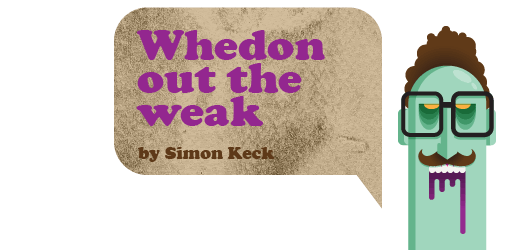Blog Archives
Whedon out the weak

I was standing in a crowd of people making mist from the chilled air with each breath taken. To stave off the cold I invaded the personal space of a giant woman in a long leather coat, nuzzling against her back as nonchalantly as I could. Her head whipped around, revealing a long neckbeard and a man’s face that shunned sunlight in favour of the glow of a computer screen.
The neckbeard told me his name was Obsidian Blackdarknightblack and introduced me to his afterlife partner Amanda. Amanda, wearing slightly less make up than her beau, asked if I was here to see Joss, placing both hands over her heart as she spoke the name Joss. I told her that I was supposed to be here to write about Joss. This time she placed her hands over her heart when I said Joss’ name. Amanda told me that she too was writing about Joss, and in fact, wrote about him in her dream journal on a daily basis. Obsidian explained they were there to sacrifice Amanda’ to Joss, so that she could bear his precious seed. I didn’t think goths could get pregnant and told them it was my theory that goths are asexual. You only ever see fat or skinny goths, so obviously when a skinny goth gets fat enough, the chunky goth splits itself into two skinny goths, and so the circle of goth continues. Obsidian said that if he wasn’t sure his make up would get smudged, he would kick the living shit out of me, and the pair spun around to face the front of the queue once more.
At most MWF events you’ll find people nodding intently at the speaker, politely bearing the appropriate amount of teeth to smile at a T.S. Elliot quote, and the occasional champagne fizz of laughter rippling through the audience. What you won’t normally see is a few hundred high-pitched Beatle-mania squeals as a writer walks on stage, and that was just from the fanboys in the crowd, the fangirls were too busy updating their twitter feeds and clawing at their multicoloured hair when Joss was introduced by Steve Grimwade and his ulcer Stephanie.
Joss Whedon walked out on stage in the robes of a standard nerd, faded jeans, a jumper, and sneakers. Someone screamed Joss and I witnessed hundreds of people place both hands over their hearts simultaneously. Joss silenced his church with a gesture. He paused for a moment before saying “I have faith…” He was cut off by a number of guys who stood up screaming “Where is she? Is she wearing the red leather pants? Please say she’s wearing the red leather pants”
The main conversation of the evening seemed to revolve around a number of Joss’ television shows being cancelled suddenly. This caused howls of rage to erupt from the audience, and people started passing around effigies of Fox executives and lighting torches. I instantly regretted wearing a suit and tie and began mentally noting where my nearest exit was in case they demanded some form of human sacrifice.
A group of the MWF volunteers began setting up microphones within the crowd, and the audience was invited to ask questions of their lord and saviour. Of those questions, five were asking if Joss would impregnate them, there were actually six asked, but I didn’t count the 40-year-old man. There was one girl who asked what every fan had been dying to know “So is there anything about your shows that, like, you like, like?” I erupted in laughter and a security guard told me I would have to leave. I told him that I didn’t think my laughter was that disruptive. He pointed out it was for my own safety and pointed to a thousand people staring at me like I was a skid mark on a hotel towel.
